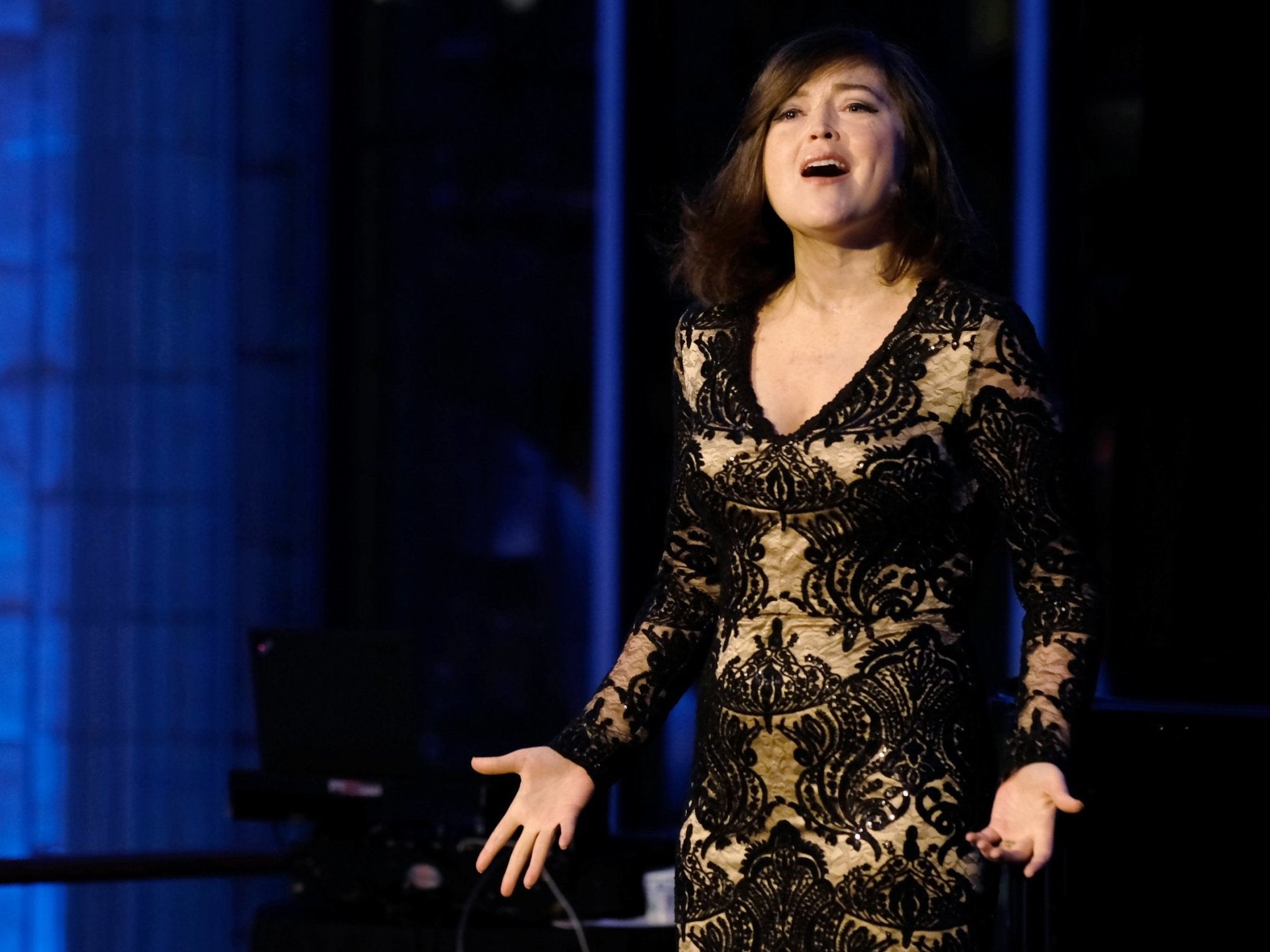Charity Tillemann-Dick: Opera singer who drew life and music from transplanted lungs
The celebrated American opera singer, who survived two double lung transplants, displayed total dedication to her art in the face of serious illness

Your support helps us to tell the story
From reproductive rights to climate change to Big Tech, The Independent is on the ground when the story is developing. Whether it's investigating the financials of Elon Musk's pro-Trump PAC or producing our latest documentary, 'The A Word', which shines a light on the American women fighting for reproductive rights, we know how important it is to parse out the facts from the messaging.
At such a critical moment in US history, we need reporters on the ground. Your donation allows us to keep sending journalists to speak to both sides of the story.
The Independent is trusted by Americans across the entire political spectrum. And unlike many other quality news outlets, we choose not to lock Americans out of our reporting and analysis with paywalls. We believe quality journalism should be available to everyone, paid for by those who can afford it.
Your support makes all the difference.For Charity Tillemann-Dick, the power of opera lay in its heroines – the consumptive courtesan who revels in the pleasures of life even as she is dying, the cloistered maiden who sacrifices herself for an ill-fated love. “They were these beautiful, strong women in impossible situations,” she said in 2013.
Fifteen years ago, aged 20, Tillemann-Dick was a promising soprano when she confronted her own impossible situation. She was diagnosed with idiopathic pulmonary hypertension, a condition of the lungs that threatened to rob her of her ability to breathe and to sing. Facing her mortality, she said she thought of her operatic heroines and felt she was living one of their stories, “music and all”.
“The question,” she said, “was how to outsmart the tragedy.”
Tillemann-Dick continued her operatic career – performing at venues including the Kennedy Centre in Washington and Lincoln Centre in New York, publishing a memoir titled The Encore and releasing her 2014 album American Grace – while undergoing two double lung transplants and enduring an aggressive form of skin cancer. She died on 23 April at a hospital in Baltimore, aged 35. The cause was complications from long-term immunosuppression from the transplants, said her husband, Yonatan Doron.
Tillemann-Dick was training in Budapest – the birthplace of her maternal grandfather, Tom Lantos, the late California Democrat who was the only Holocaust survivor to serve in congress – when she received what proved a prophetic admonition from her vocal coach about achieving greatness. “You must get very sick,” the teacher said, “you must fall in love, and you must work, work, work.”
Shortly thereafter, in May 2004, Tillemann-Dick received the diagnosis that explained her fainting spells. Pulmonary hypertension causes the vessels that carry blood to the lungs to become defective, severely straining the heart and, eventually, leading to death.
Compounding the tragedy of the diagnosis was the warning from a specialist that Tillemann-Dick must stop singing. “Those high notes are going to kill you,” she recalled the physician telling her. “She was absolutely emphatic: I was singing my own obituary.”
But throughout her illness, even as it left her at times unable to walk, stand and breathe, Tillemann-Dick refused to surrender her ability to sing. “As air came up from my lungs through my vocal cords and passed my lips as sound, it was the closet thing I had ever come to transcendence,” she said in a 2010 TedMed talk. “I wasn’t going to give it up.”
For several years, Tillemann-Dick managed her illness by taking Flolan, a medication delivered intravenously by a pump that she kept on her person 24 hours a day. She continued training, auditioning and performing in Europe and in the United States. “I would stuff it into my girdle before going onstage,” she said, recalling the obtrusive pump.

As the disease progressed, Tillemann-Dick endured two grievous losses: the death of Lantos to cancer in 2008 and the death of her father weeks later from injuries sustained in a car crash. By the next year, it was clear she would not survive without a lung transplant. In September 2009, physicians found a match – a surprise that, for the young singer, was not entirely welcome news.
“Despite their problems, I spent my whole life training my lungs,” she said in the TedMed talk, “and I was not particularly enthusiastic about giving them up.”
During the 13-hour surgery at the Cleveland Clinic, Tillemann-Dick said she flatlined twice. She endured a 34-day coma after it was over. She had to relearn how to walk, talk, eat and, eventually, sing. Her surgeon had performed a tracheotomy, inserting a breathing tube directly into her windpipe to avoid damaging her vocal cords.
By early 2011, her body had begun rejecting the transplanted organs. She went on with life as best as she could, marrying and, in September 2011, singing at the Lincoln Centre. In her memoir, published in 2017, she recalled the exhilaration of performing “Sempre Libera” from La Traviata: “My voice floods the theatre with Verdi’s immortal aria,” she wrote. “I inhale and my lungs fill with air. When I sing, it is a joyous communion with God ... I spin out a high C and the audience erupts in spontaneous applause.”
“Applause follows me as I step behind the curtain and collapse into a wheelchair,” she continued. “My lungs – my instruments – are failing. I am dying. As we round the corner to my dressing room, tears stream down my cheeks. My dream is no longer a future hope – some distant possibility. It’s real. Even if my voice is silenced forever, I’ve just shared the greatest performance of my life in the greatest concert hall in the world.”

In January 2012, she received a second transplant that allowed her several years of health and continued performance until her cancer diagnosis in 2015. Transplant patients, because of the immunosuppressive drugs they must take, face increased risk of certain forms of cancers. Tillemann-Dick often expressed her gratitude to the donors who had extended her life, and her ability to sing.
“For me, singing with someone else’s lungs – it never lets me forget that I’m not the one who’s in charge, whether you call it fate or chance or God,” she told NPR in 2017. “We all have a reason that we’re here. We all have a song to sing, whether it’s musical or not. And I am very conscious of the fact that I am one of the human embodiments of my organ donor’s life.
Charity Sunshine Tillemann-Dick was born to a Mormon-Jewish family in Denver on 22 July, 1983. As a child, her family took her to see the opera Hansel and Gretel by 19th century German composer Engelbert Humperdinck. The performance “was spellbinding for me”, she told CNN. “I knew I wanted to sing and that I wouldn’t be happy doing anything else.”
After being home-schooled, she enrolled at Regis University in Denver at 14 and received a bachelor’s degree in politics and economics, with a minor in music, in 2002. While receiving treatment at Johns Hopkins hospital in Baltimore, she studied at the Peabody Institute there, receiving a graduate degree in voice in 2006. She was later a Fulbright fellow at the Liszt Academy in Budapest.
In addition to her husband of seven years, survivors include her mother, Annette Lantos Tillemann-Dick; her maternal grandmother, Annette Lantos; her paternal grandmother, Nancy Dick, a former lieutenant governor of Colorado; five brothers; and five sisters.
In her public appearances, Tillemann-Dick praised the doctors who had so carefully guarded her voice, treating her as a person and not simply treating her disease. “Whether by a Mack truck or by heart failure or faulty lungs, death happens,” she said in the TedMed talk. “But life isn’t really just about avoiding death, is it? It’s about living.”
And no opera, however great, she observed, “could hope to capture the messy, grotesque, gorgeous truth of life”.
Charity Sunshine Tillemann-Dick, singer, born 22 July 1983, died 23 April 2019
© Washington Post
Join our commenting forum
Join thought-provoking conversations, follow other Independent readers and see their replies
Comments